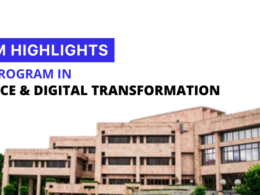As a member of the military, transitioning out of service and into civilian life can be a daunting prospect. After years of service, it can be difficult to know what to do next and how to find a career that provides the same sense of purpose and fulfillment. Fortunately, there are many opportunities available for veterans who are interested in pursuing a career in data science.
Whether you’re a recent veteran looking to make the transition to civilian life, or a long-time veteran looking for a new challenge, this blog is designed to help you find purpose beyond the uniform and build a fulfilling career in data science. With the right mindset and approach, you can leverage your skills and experience to make a successful transition and thrive in this exciting field.
Data science is a rapidly growing field that offers many opportunities for those with the right skillset. And, surprisingly, many of the skills you’ve honed during your time in the military are highly transferable to the world of data science.
From the Frontlines to the Data Mines: Transitioning from Defence to Data Science
Let’s explore some of the ways in which your experience in defence can be leveraged in a data science career.
1. Problem-solving
In the military, problem-solving is a daily task. Whether you’re faced with a complex mission or a challenging obstacle, you have the ability to work through problems and find solutions quickly.
In Data Science, this skill is highly valued. Data scientists are tasked with analyzing large amounts of data and finding insights that can help solve business problems. The ability to think critically and solve problems is essential in this field.
2. Attention to Detail
In the military, the smallest detail can make the difference between success and failure. Attention to detail is another skill that is highly valued in data science.
Similarly, in Data Science, small mistakes can have big consequences. The ability to spot errors and maintain a high level of accuracy is critical.
3. Adaptability
As a member of the military, you know that things can change quickly. The ability to adapt to changing circumstances is essential.
Similarly, in Data Science, the field is constantly evolving, and being able to adapt to new tools, technologies, and methodologies is critical for success.
4. Leadership
Leadership is another transferable skill that is highly valued in data science. As a member of the military, you have likely had experience leading teams, managing resources, and making decisions under pressure.
These skills can translate well into a Data Science career, where project management and leadership are essential.
The Next Mission: Transitioning from Defence to Data Science
We will provide a guide to help veterans transition to a career in Data Science and find purpose beyond the uniform.
A. Seek Out Educational and Training Opportunities
While there are many transferable skills from military service to data science, it’s important to gain a foundational understanding of the field. Seek out educational opportunities such as online courses, bootcamps, or degree programs in data science, statistics, or computer science.
Many institutions offer programs specifically designed for veterans, and some may offer scholarships or financial assistance.
B. Build Your Professional Network
Networking is a critical aspect of any career transition. Attend industry events and conferences, connect with other veterans in the field, and join professional organizations like the Veterans in Data Science (VIDS) network.
By building your professional network, you can gain valuable insights into the industry and find potential job opportunities.
C. Tailor Your Resume and Cover Letter
When applying for data science positions, it’s important to tailor your resume and cover letter to highlight your relevant skills and experience. Use keywords and phrases that are commonly used in the data science field, and provide specific examples of projects or initiatives you’ve led that demonstrate your skills.
D. Prepare for Interviews
Preparing for interviews is critical in any job search, and data science interviews can be particularly challenging. Research the company and the role, and prepare responses to common interview questions. Be prepared to discuss your military service and how it has prepared you for a career in data science.
Transitioning from military service to a civilian career can be a challenging process, but a career in data science offers veterans an opportunity to find purpose beyond the uniform.
By identifying transferable skills, seeking out educational and training opportunities, building a professional network, tailoring your resume and cover letter, and preparing for interviews, you can position yourself for success in this exciting and rewarding field.
Remember, you have already proven yourself as a leader and problem-solver in the military, and with the right mindset and approach, you can excel in Data Science.
Looking to establish a career in Data Science? Look no further! Our world-class Data Science programs, in collaboration with E&ICT IIT Guwahati, are designed to provide you with the skills and knowledge you need to succeed in this field.
Be sure to explore our collection of Data Science resources, so you can continue learning and refining your skills as you pursue your career goals. Don’t miss out on this opportunity to pave the way for a successful career in Data Science!





